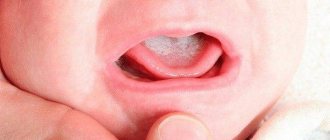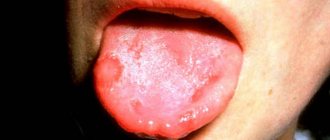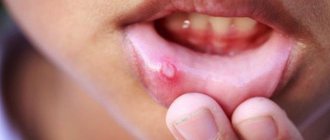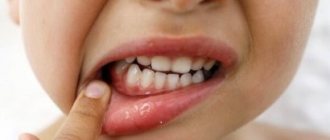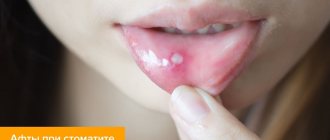Fast passage
Colds Influenza Infectious mononucleosis Labial herpes (herpes on the lips, cold sores on the lips) Herpes aphthous stomatitis Enteroviral stomatitis
Conditions that we used to call “colds” are most often affected by young children who do not yet have antibodies to respiratory viruses due to their early age. Over time, such antibodies developed in children who have recovered from the disease become their natural defense. The only acute respiratory viral infection that can be protected against through vaccination is influenza.
According to statistics, a child from birth to school can get ARVI more than 50 times (from 6-8 times a year). To date, more than 200 types of viruses that cause colds have been identified.
Most often, colds are observed in young children who have just started attending kindergarten (and in younger schoolchildren who have not attended kindergarten, have not been exposed to certain viruses and do not have immune protection). At this time, the usual complaints of parents at a pediatrician’s appointment are complaints about the caretakers’ oversight: “hypercooled,” “blown,” etc. In fact, the role of hypothermia and drafts in the development of colds is no longer seriously considered by science.
“Cold” (eng. - cold) is most often associated with a large-scale exchange of viruses between children in large children's groups.
Kindergartens, development centers, sports sections and even outdoor playgrounds are an excellent “collective reservoir” of infectious pathogens, and young children who are not yet accustomed to personal hygiene are super-spreaders (in many cases asymptomatic) of various respiratory viruses.
Cold
The first symptoms of a cold most often manifest themselves in the form of a sore and sore throat, nasal congestion, runny nose, sneezing, and cough. They usually occur 2–3 days after exposure to a virus (usually rhinovirus). The child may look lethargic, complain of increased fatigue, headaches and muscle pain, eat poorly or refuse to eat at all, and have a fever.
There is no specific treatment for colds (there are no proven effective drugs). To relieve headaches, muscle pain, and reduce high fever, the child can be given paracetamol or ibuprofen (children over 3 months).
Attention: aspirin should not be given to children! The dosage of such medications should be recommended by a doctor. Always follow the instructions for the drug if a quick consultation with a pediatrician is not possible.
There is no evidence that over-the-counter antihistamines and decongestants (decongestants) provide relief in children under 6 years of age. Moreover, medications containing decongestants can cause unwanted side effects in young children, ranging from increased excitability and hallucinations to abnormal heart rates, especially in infants.
It is very important that during illness the child drinks a lot (the best option is clean drinking water, but you can offer what he likes best - juices, compotes). Ventilate the room regularly, use a humidifier, and rinse the child's nose with saline solution. Children over 1 year of age can be given honey (no more than half a teaspoon); rubbing the chest with menthol ointments to relieve cough is not recommended for children under 2 years of age. Cough lozenges or tablets are recommended for children over 4 years of age; a small child may choke on them. Do not use multi-ingredient over-the-counter cold and cough medicines if your child is under 6 years of age. They are ineffective and can cause serious side effects. The use of such drugs is questionable in principle, but it is also important to understand that they may contain paracetamol and lead to an overdose if you have already given it to a child.
For colds in children, the use of alternative treatments (echinacea, etc.), increased doses of zinc or vitamin C has been proven ineffective. They do not relieve or reduce symptoms and can cause severe side effects in young children.
If your child's condition does not improve after 3 days from the onset of symptoms, make an appointment with your pediatrician. An examination is necessary to exclude other diseases (streptococcal infection, sinusitis, bronchitis, pneumonia) and prescribe adequate treatment.
See your doctor immediately if you have the following symptoms: cough with a lot of mucus, difficulty breathing, severe weakness, vomiting, dehydration, severe sore throat, fever of 39 °C or more, fever for 24 hours or longer, abdominal pain, pain in the ears, enlarged cervical lymph nodes.
When immunity is in short supply
Some children and adults may actually develop immune deficiencies. For example, this might happen:
- due to genetic disorders,
- chemotherapy
- for immunodeficiency diseases
Many of these children really need a “boost” of their immune system. But this can only be done by an immunologist, who will carefully study the causes and nature of immune disorders, find out the current level of immunity, and only then begin to treat immune disorders. The doctor will use methods such as injecting antibodies obtained from donors, giving growth factors to stimulate the production of white blood cells, or even resorting to a bone marrow transplant. For people with true immunodeficiency, it would be dangerous (and potentially fatal) to rely on vitamins, supplements, or “superfoods” to “boost” the immune system, rather than pursuing drug treatment aimed at addressing the cause of the immunodeficiency in the first place.
Flu
An annual flu vaccination is the most reliable way to prevent severe disease and complications (otitis media, pneumonia) of the disease.
Vaccination of children against influenza is permitted from the age of six months.
Influenza is an acute respiratory viral disease caused by influenza viruses (usually types A or B; type C rarely causes serious symptoms). It is very easily transmitted from person to person, as confirmed by annual epidemics of the disease. People with the flu are most contagious in the 24 hours before symptoms appear and until symptoms subside (about a week).
The flu can be confused with a cold, but most often it is more severe. Symptoms - fever, chills, headache and muscle pain, runny nose, sore throat, cough, ear pain, loss of appetite, weakness, nausea, vomiting, diarrhea - appear approximately 2 days after exposure to the virus.
Most children with the flu recover at home, but if the disease is severe or has complications, they will need hospital treatment.
There are no effective cures for the flu; it is necessary to ensure that the child drinks plenty of fluids and is not dehydrated, gets plenty of rest and sleep; in general, the same tactics are followed here as with any ARVI. To relieve flu symptoms (reduce fever and reduce pain), you can use paracetamol or ibuprofen, rinse your nose with saline solution (for infants, saline solution is dripped into the nose, an aspirator is used to remove nasal discharge), and monitor the level of humidity in the room.
Important: antibiotics are not used to treat influenza and other acute respiratory viral infections.
Seek immediate medical attention if symptoms worsen, severe cough, difficulty breathing, fever in children under 3 months of age that lasts longer than 3 days, headache that does not go away with paracetamol or ibuprofen, stiff neck ( meningeal symptom).
More details
Flu
Sources
- Lenart M., Działo E., Kluczewska A., Węglarczyk K., Szaflarska A., Rutkowska-Zapała M., Surmiak M., Sanak M., Pituch-Noworolska A., Siedlar M. miRNA Regulation of NK Cells Antiviral Response in Children With Severe and/or Recurrent Herpes Simplex Virus Infections. // Front Immunol - 2022 - Vol11 - NNULL - p.589866; PMID:33679688
- Gündoğdu M., Erden N., Karagun E., Acıpayam AŞF., Vural S. Annual pattern and clinical characteristics of herpes zoster in immunocompetent children in a rural area. // Dermatol Ther - 2022 - Vol34 - N1 - p.e14570; PMID:33219711
- Huang CW., Hsieh CH., Lin MR., Huang YC. Clinical features of gingivostomatitis due to primary infection of herpes simplex virus in children. // BMC Infect Dis - 2022 - Vol20 - N1 - p.782; PMID:33081701
- Cosme I., Ramírez MA., Peñata CA., Beltrán-Arroyave C., Florez ID. Human Herpes Virus 6 Detection in Children With Suspected Central Nervous System Infection. // Pediatr Infect Dis J - 2022 - Vol39 - N12 - p.e469-e471; PMID:32925539
- Weinmann S., Irving SA., Koppolu P., Naleway AL., Belongia EA., Hambidge SJ., Jackson ML., Klein NP., Lewin B., Liles E., Marin M., Smith N., Weintraub E. ., Chun C. Incidence of herpes zoster among varicella-vaccinated children, by number of vaccine doses and simultaneous administration of measles, mumps, and rubella vaccine. // Vaccine - 2022 - Vol38 - N37 - p.5880-5884; PMID:32444193
- Kanamori K., Shoji K., Kinoshita N., Ishiguro A., Miyairi I. Complications of herpes zoster in children. // Pediatr Int - 2022 - Vol61 - N12 - p.1216-1220; PMID:31628883
- Aktaş H., Erdal SA., Güvenç U. Herpes Zoster in children: Evaluation of the sixty cases. // Dermatol Ther - 2022 - Vol32 - N6 - p.e13087; PMID:31515892
- Hwang JH., Kim KH., Han SB., Kim HH., Kim JH., Lee SY., Choi UY., Kang JH. A clinical-epidemiological multicenter study of herpes zoster in immunocompetent and immunocompromised hospitalized children. // Clin Exp Vaccine Res - 2022 - Vol8 - N2 - p.116-123; PMID:31406693
- Agharbi FZ. . // Pan Afr Med J - 2022 - Vol32 - NNULL - p.199; PMID:31312311
- Pittet LF., Curtis N. Does oral antiviral suppressive therapy prevent recurrent herpes labialis in children? // Arch Dis Child - 2019 - Vol104 - N9 - p.916-919; PMID:31311776
Infectious mononucleosis
Another disease of viral etiology with severe “cold” symptoms. The main causative agent of infectious mononucleosis is the Epstein-Barr virus (rarely other viruses). The infection spreads through saliva.
The disease is typical for adolescents and young adults (the so-called “kissing disease”), but young children can also become infected with infectious mononucleosis through contact with objects touched by an infected person (for example, through dishes). Most adults already have antibodies to IM because they have been exposed to the infection, so they are immune and do not get sick. In people with a weakened immune system due to concomitant pathologies or organ transplantation, MI can cause serious complications and other diseases (anemia, meningitis, encephalitis, myocarditis, etc.).
Symptoms of MI appear approximately 4–6 weeks after infection and may develop slowly and not all at the same time. They include severe sore throat, weakness, fatigue, fever, loss of appetite, enlarged neck and axillary lymph nodes, inflammation of the tonsils with white plaque, headache, muscle pain, skin rashes, abdominal pain, enlarged spleen or liver.
Most patients recover within 2–4 weeks of onset of symptoms, but some continue to experience symptoms of MI (eg, fatigue, enlarged lymph nodes, splenomegaly, hepatomegaly) for several weeks or even months.
The disease is diagnosed based on symptoms, their duration and specificity, as well as a physical examination. A blood test for antibodies to the Epstein-Barr virus and a general blood test to determine the level of leukocytes (prescribed if necessary) help confirm the diagnosis.
The symptoms of MI are quite unpleasant and cause significant discomfort to the patient, but the disease goes away on its own, without treatment or any consequences. Drinking plenty of fluids, rest and a healthy diet are recommended. To relieve symptoms (sore throat, headache, muscle pain, fever), it is recommended to use paracetamol or ibuprofen, or gargle with salt water. The addition of a secondary infection (streptococcal, for example) requires the use of antibacterial drugs. If the airways are severely narrowed and there is difficulty breathing, corticosteroids may be prescribed. To reduce the risk of rupture of the capsule of an enlarged spleen or liver, it is recommended to avoid exercise, heavy lifting, and contact sports for at least a month, or until the liver and spleen return to normal size.
How does the immune system work?
Every day, a child’s body is constantly exposed to viruses, bacteria, fungi and parasites. The vast majority of these microbes (or pathogens) never enter the body because they are retained by the skin barrier, mucous membranes, or destroyed in the stomach by hydrochloric acid. Ironically, another factor that protects the baby from infections is his own bacteria, which coexist with humans for mutual benefit, living on the skin and in the gastrointestinal tract. They help prevent infections by competing with foreign pathogens for nutrients and living space. These initial levels of protection against infection are very effective. It may seem strange, but small children are not poorly protected by nature from bacterial and viral attacks. And even more so for breastfed children, because along with their mother’s milk they also receive immune cells from her. Those pathogenic microbes that do make their way through these barriers must be neutralized before they can multiply and poison the body.
Labial herpes (herpes on the lips, cold sores on the lips)
Labial herpes is a highly contagious and common viral infection caused by herpes simplex virus type 1 (less commonly type 2). Most people by the age of puberty already have this virus in their body and are its carriers, even without symptoms. After infection, the virus “sleeps” for some time in the nerve cells of the facial skin, and when activated, it causes a cold on the lips. Exacerbations may be caused by a viral infection or fever, hormonal changes, increased fatigue or stress, prolonged or intense exposure to sunlight, decreased immunity, or skin trauma.
The herpes simplex virus is transmitted through close contact (for example, by kissing), and is contagious even in the absence of obvious rashes on the lips. It appears as small, painful blisters (filled with clear fluid) on the lips (sometimes near the mouth or nose), which are usually grouped together, so the size of the lesion can range from a few millimeters to several centimeters.
After the bubbles burst, a crust forms in their place. Herpes on the lips usually goes away in 2-3 weeks, leaving no scars.
The disease occurs in several stages. The initial symptoms are tingling, itching or burning in the lips, then blisters appear, which merge and burst over time, leaving small wounds oozing liquid, after which a crust forms in their place. The first episode (manifestation) of the disease may be accompanied by fever, sore throat, sore muscles, headache, sore gums, and swollen lymph nodes. Recurrent infection is usually milder. Symptoms of cold sores most often occur in children between 1 and 5 years of age.
In the typical course of the disease, diagnosis does not require the use of specific studies; it is enough for the doctor to conduct an examination and find out the medical history. Diagnosis is usually based on symptoms.
There are no medications aimed at the cause of the disease. As a rule, herpes on the lips goes away on its own, without treatment. The healing process can be accelerated by using antiviral drugs in the form of ointments or tablets (acyclovir, valacyclovir, famciclovir). Reducing discomfort and pain is achieved through the use of local products containing alcohol (dries and accelerates healing), lidocaine or benzocaine (for very uncomfortable and painful conditions), antipyretic and analgesic drugs (for fever, severe pain). Cold compresses reduce redness and help remove crusts.
Before going outside, lips and face should be protected from the sun (with a product containing zinc oxide) and moisturizing balms should be used.
It is necessary to consult a doctor if herpes on the lips of a child does not disappear within 2 weeks, the disease is severe, there is irritation in the eyes during an exacerbation, relapses of herpes occur frequently, the child has a weakened immune system (due to some disease), there are diseases such as atopic dermatitis.
How many times do you get sick?
In reality, a child will suffer from colds quite often (normally up to 8-10 times a year until primary school age, and up to 4-5 times a year in secondary school). The high incidence is associated with the gradual development of the protective immune system and its successive “acquaintance” with various strains of viruses that cause colds. Only by “remembering” certain types of viruses, the immune system is able to effectively fight pathogens, preventing or mitigating the severity of the disease.
However, parents, sincerely wanting the best for their children, are constantly looking for means and ways to “strengthen the child’s immunity,” especially since advertising persistently suggests that this is really possible with the help of vitamins, nutritional supplements and “magic” yoghurts or drinks.
Herpes aphthous stomatitis
In children under 5 years of age, herpes simplex can affect the mouth, gums, and tongue (herpes aphthous stomatitis). In this condition, the mucous membrane of the oral cavity turns red, swells, the child begins to drool, small superficial ulcerations (aphthae) appear once within 1–2 days - single or grouped, the child becomes irritable, his gums swell, he complains of pain, loses appetite. The temperature usually rises (can reach 40°C) 1-2 days before the above symptoms.
After 3–14 days from the onset of symptoms, the child’s condition returns to normal, the temperature decreases, aphthae heal, inflammation and pain decrease, and appetite appears. With a more severe course, a repeated increase in temperature, aphthae may appear again, and the cervical and submandibular lymph nodes become enlarged. Recovery in this case may take up to 10 days. A complication of herpes aphthous stomatitis can be the transition of the disease to a recurrent form. The addition of a bacterial infection can cause otitis media, bronchitis or pneumonia.
Treatment of herpes aphthous stomatitis is aimed at eliminating symptoms (lowering temperature, pain relief with paracetamol or ibuprofen, drinking plenty of fluids, rest). Rinsing with aseptic solutions, the use of local anesthetics, antiviral ointments for treating aphthae (acyclovir), steroids in the form of gels and pastes are prescribed. Local treatment with lidocaine-based anesthetic ointments should not be administered to young children.
Features of the immune system in children
advises a medical pediatrician How to strengthen a child’s immunity - this is a question that worries every mother who is influenced by advertising from TV or the Internet, which frightens her every day that she and her baby simply need to purchase and use various medicines, vitamins, nutritional supplements, yoghurts, and other products that will instantly “strengthen” the child’s immunity. In this article we will look at how immune defense works in children, what affects it, and in which cases something needs to be done to “strengthen” it, and in which cases not.
Enteroviral stomatitis
Enteroviral stomatitis (hand-foot-mouth syndrome) is also characterized by the formation of painful aphthae on the tongue, under the tongue, on the mucous membranes of the cheeks and lips, on the soft palate and at the base of the gums. Accompanied by a blistering rash around the mouth, on the palms, back of the hands, feet, back of the thighs and buttocks of the child, fever, sore throat, headache, loss of appetite.
The causative agents of enteroviral stomatitis are the Coxsackie virus and other enteroviruses. The disease is very common among young children in the summer and is transmitted through contact with an infected person through the airborne or fecal-oral route: through dishes, hygiene items, bedding, toys.
The incubation period (from infection to the onset of symptoms) is 3 to 6 days. Fever is often the first sign of illness. Painful aphthae in the mouth appear 1–2 days after the onset of fever, then rashes are observed on the arms, legs and buttocks. Enteroviral stomatitis does not require special treatment, all signs and symptoms of the disease usually disappear after a week, and the child’s condition returns to normal.
Diagnostics
During your initial visit, you can visit a pediatrician or dermatovenerologist. However, if the disease often recurs, you should be examined by an infectious disease immunologist. He will make a qualified conclusion after all diagnostic measures. If the diagnosis is confirmed, antiviral drugs and immunostimulants are prescribed. The course of the disease is monitored by a specialist without fail. He will monitor whether positive changes have occurred. Periodic observations with a doctor will help keep the situation under control. Parents should not do this on their own. The child needs to undergo regular examinations for changes in well-being. In addition, after the first diagnosis, doctors will advise how to choose the baby’s diet and prescribe other measures that can improve the child’s condition. You can get diagnosed by an immunologist as soon as the first symptoms of an unpleasant illness appear. It is better to prevent the disease than to deal with its consequences and complications, especially since it is impossible to remove this virus from the body.
Another option for helping the immune system is vaccination.
This is a really great and completely “natural” way to strengthen the immune system in a specific and effective way. When vaccinated, the child's body is exposed to part of the pathogenic microorganism or its weakened version, this stimulates the formation of a specific immune response to the specific disease against which the vaccine is created. Such immunity will be active for a long time due to the production of specific antibodies. Some people argue that the immunity provided by vaccination is not as long-lasting or strong as “natural” immunity. In many cases this is true. But let’s not forget that for “natural” immunity (for example, lifelong immunity), you need to get sick from an infectious disease, which in the case of dangerous infections can end sadly. In our opinion, to acquire immunity, you still don’t need to get sick. Immunization is one of the safest and most effective tools you can use to reduce your child's risk of developing certain infections, many of which can be truly life-threatening.
Drug treatment
One of the most common misconceptions is that herpes is treated with antibiotics. None of the viral infections are treated with penicillin. In fact, treatment is carried out using antiherpetic drugs.
Modern pharmacology can offer an impressive list of effective drugs that are aimed at fighting the virus.
Schemes designed for the comprehensive fight against herpes are developed by a doctor for each individual individually, based on the method of penetration of the virus into the body, the severity and form of the disease.
The medicinal substance – Ciclovir – is an “ambulance” at the first symptoms.
This group includes the following drugs:
- Acyclovir;
- Famciclovir (Famvir);
- Penciclovir (Vectavir);
- Panavir.
Drugs
One of the reasons for the appearance of herpes is a decrease in the body’s defenses and a change in their activity.
Correction of the immune system is a very important part of treatment, which involves the use of:
- immunoglobulin - it has antitoxic and immunomodulatory effects. Such drugs are: Groprinosin, Immunal, Arpetol.
- interferon – it has an immunoregulatory and antiproliferative (activates immune cells) effect. In medical practice the following are used: Herpferon, Amiksin, Cycloferon, Kagocel.
These drugs can effectively relieve the symptoms of herpes and prevent its reappearance for a long time.
So what to do with “immune yoghurts”? is there or not? Let's summarize:
If your child's immune system is functioning normally - responding properly to infections and not showing signs of overreactivity - then nothing special needs to be done. You just need to stop watching advertising and constantly worry unjustifiably “about immunity”, accepting the fact that no matter how hard we try, children will get sick, and no matter how hard pathogenic microorganisms try, children will get better.
Regarding “yogurts” - the food product is intended for nutrition and nothing more. Naturally, eating is healthy, and not eating is harmful. Yogurt does not cure anything; they are treated with medications correctly prescribed by a doctor and sold in pharmacies.
If you are concerned that your child does have a problem with the immune system, talk to your pediatrician or consult an immunologist.
Instead of looking for a “magic pill” to “strengthen immunity,” teach your child to wash his hands very often, love walks and exercise, and carry out routine vaccinations.
These simple measures will bring much more benefits. Call a doctor at home Make an appointment with a doctor or call +7 (812) 331-17-74
